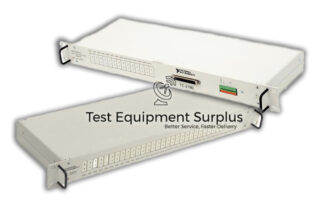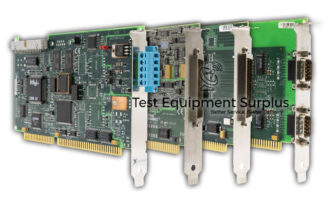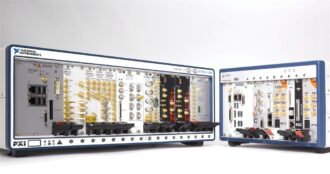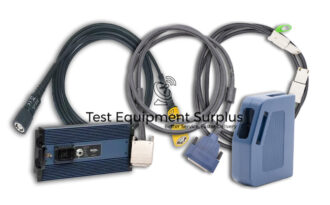Description
The NI CP400X Oscilloscope Probe, part number 784254-01, is a single-ended, passive oscilloscope probe designed for precision.
It operates within a voltage range of -60 to 60 V and offers a 10 X attenuation factor, making it suitable for a variety of electrical measurements. This probe is compatible with instruments that have a 1 MOhm input impedance, ensuring accurate readings and compatibility with standard oscilloscopes.
Featuring BNC connectors on both the front and back end, the NI CP400X facilitates secure and reliable BNC to BNC connections. Its bandwidth capability reaches up to 400 MHz, allowing users to capture high-frequency signals with ease.
Moreover, this oscilloscope probe can measure currents as low as 5 Arms, making it versatile for a wide range of current measurement applications. It is particularly well-suited for use in measurement systems where there is exposure to vibration from equipment like engines and pumps.
| Specification | Detail |
|---|---|
| Product Name | NI CP400X Oscilloscope Probe |
| Part Number | 784254-01 |
| Type | Single-Ended, Passive Oscilloscope Probe |
| Operating Voltage Range | -60 to 60 V |
| Attenuation | 10 X |
| Compatible Input Impedance | 1 MOhm |
| Connector Type | BNC (both front end and back end) |
| Bandwidth | Up to 400 MHz |
| Current Measurement Capability | As low as 5 Arms |
| Application | Measurement systems with vibrating equipment (engines, pumps, etc.) |
| Connection Type | BNC to BNC |
Question 1: What are the key features and compatibility details of the NI CP400X Oscilloscope Probe with part number 784254-01?
Answer 1: The NI CP400X Oscilloscope Probe can accurately capture frequencies up to 400 MHz due to its bandwidth capability.
Question 2: What are the key features and specifications of the NI CP400X Oscilloscope Probe, including its part number, voltage range, attenuation factor, compatibility, connection type, bandwidth capability, and current measurement capacity?
Answer 2: The NI CP400X Oscilloscope Probe, part number 784254-01, features a single-ended, passive design with a -60 to 60 V voltage range, 10 X attenuation, compatibility with 1 MOhm input impedance oscilloscopes, BNC to BNC connections, a bandwidth of up to 400 MHz, and the capability to measure currents as low as 5 Arms, making it well-suited for precision electrical measurements in environments with vibration.
Question 3: What is the bandwidth capability of the NI CP400X Oscilloscope Probe, and why is it particularly suitable for environments with vibrations from equipment such as engines and pumps?
Answer 3: The bandwidth capability of the NI CP400X Oscilloscope Probe is up to 400 MHz, and it is particularly well-suited for measurement systems that are exposed to vibration from equipment such as engines and pumps due to its robust design.
Question 4: What is the maximum frequency that the NI CP400X Oscilloscope Probe can accurately capture due to its 400 MHz bandwidth capability?
Answer 4: The NI CP400X Oscilloscope Probe, part number 784254-01, features a voltage range of -60 to 60 V, a 10 X attenuation factor, and is designed for use with instruments having a 1 MOhm input impedance. It offers BNC to BNC connections and a bandwidth capability of up to 400 MHz, along with the ability to measure currents as low as 5 Arms, making it a versatile tool for capturing high-frequency signals and conducting precise electrical
Question 5: What is the bandwidth capability of the NI CP400X Oscilloscope Probe, and in what types of measurement systems is it particularly well-suited due to its robust design against vibration?
Answer 5: The NI CP400X Oscilloscope Probe has a bandwidth capability of up to 400 MHz, which is particularly suitable for environments with vibrations from equipment such as engines and pumps because it can accurately capture high-frequency signals that may be generated in these settings.





